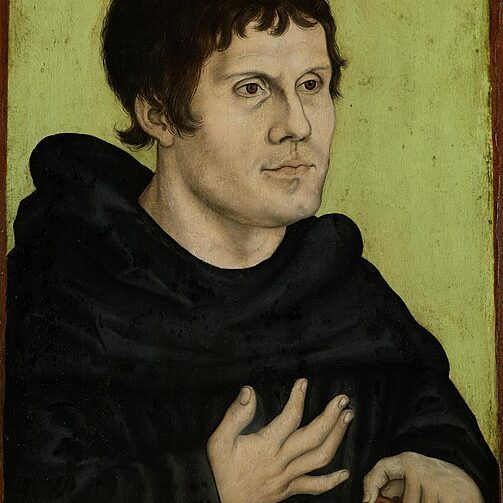
By Workshop of Lucas Cranach the Elder –
1./2. The Bridgeman Art Library, Object 292280
3. Germanisches Nationalmuseum
4. Unknown source
5. Cranach Digital Archive
Public Domain https://commons.wikimedia.org/w/index.php?curid=6830813
Spirituality Critiquing Your Own Religiosity Or Scrupulosity
SPIRITUALITY CRITIQUING YOUR OWN RELIGIOSITY OR SCRUPULOSITY
For by the grace given to me I say to everyone among you not to think of yourself more highly than you ought to think, but to think with sober judgment, each according to the measure of faith that God has assigned.
[Romans 12:3]
There is a tendency for religious people to get carried away with their religiosity. People have flogged themselves with whips or worn [hair shirts]. to “mortify the flesh” (which is the way the ancient King James language renders [Romans 8:13]. Monks who fasted sometimes worried that if they swallowed their own saliva, God would hold it against them for breaking their fast.
Sex is one area where religious people get especially carried away. Religious people throughout history, tormented by the idea that sexual arousal or pleasure is sinful, have policed their thoughts for any hint of lust. If they let their eyes linger on a lingerie advertisement or nude painting, they feel they have violated Jesus’s words from the Sermon on the Mount: “If your right eye causes you to sin, tear it out and throw it away; it is better for you to lose one of your members than for your whole body to be thrown into hell” [Matthew 5:29]. They hear these words literally and spend their lives terrified of hellfire, though presumably it was God who created us as sexual beings and, perhaps through some oversight, established sex as the way human beings would reproduce.
People who sought out life in a monastery were often trying to escape their mental torment, but they found they could not escape themselves. The monk Martin Luther would go to confession multiple times a day. He couldn’t feel confident that he was truly sorry, or that his plea for forgiveness was genuine enough. He imagined God as a bright light that illuminated all of his sins. He had a spiritual conversion, though, when he realized that the light was not God: it was the devil. Martin came to understand that Jesus’ work had made his own sinfulness irrelevant—God loved him enough to forgive those sins. Why should he doubt God’s ability to forgive him, or that forgiveness require him to gin up some “real” guilty feelings? His personal conversion transformed not only his own theological thinking, but started the Protestant Reformation.
So it was that many monastics learned to be gentle with these zealous tendencies, because religiosity often masks deep wounds or insecurities. Wise monks wrote about the dangers of “heroic faith,” the tendency for us to try to impress God or win some kind of cosmic virtue contest. Roberta Bondi, telling stories of these ancient monastics, writes,
Beginners in the desert had to learn to be humble, that is, to abandon the heroic image of the self and learn to believe that all human beings, themselves included, were weak and vulnerable. They had to learn instead to take up appropriate tasks, and appropriate tasks for weak and vulnerable human beings are ones that can actually be performed… How much easier it is to daydream about the dramatic acts of love and self-sacrifice I or the church might make to prove our love of God or neighbor!
BONDI, TO LOVE AS GOD LOVES, P. 47
An abbott of a monastery prescribed an unusual therapy for one of his monks who was worried about his own sinfulness: he told him to steal small things from his fellow monks. The abbott would then return the items at night. Today, we can see that this was a form of exposure therapy. The abbott was training the young monk to worry less about his sinfulness by prescribing theft.
The human tendency toward heroic moralism is not merely a religious one. I find the same sorts of guilt, doubt, and self-incrimination in activist and social justice circles. The language is often just as harsh and unforgiving. Sometimes it does rise to the level of mental health problem: Obsessive-Compulsive Disorder expressed in religious terms is called scrupulosity, which Joseph Ciarrocchi explores in his book [The Doubting Disease].
But even if our doubt and self-recrimination doesn’t rise to the level of a clinical disorder, it’s important to recognize that even God doesn’t want us to be _too_religious. Our job isn’t to become moral heroes. It’s more important for us to learn to be truly human in solidarity with all the other weak and vulnerable humans on this planet.
Prayer:
Author of Life, wherever our religion works against on your desired flourishing for all of creation, help us to humbly critique our own religiosity.
—Rev. Dr. David Barnhart, Jr.
